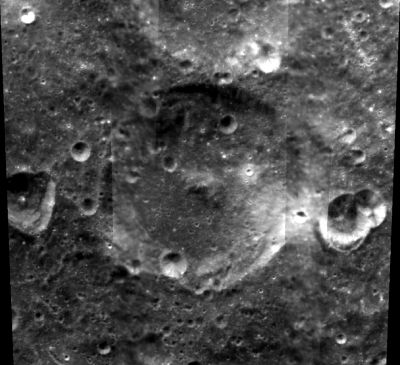Leavitt
Contents
Leavitt
| Lat: 44.8°S, Long: 139.3°W, Diam: 66 km, Depth: km, Rükl: (farside) |


left: Clementine . right: LROC . Leavitt at center, satellite Z on top. The prominent peak seen at right is part of eastern South Pole - Aitken Basin inner ring.
Images
LPOD Photo Gallery Lunar Orbiter Images Apollo Images
Mons Leavitt (unofficial name; east of Leavitt) illuminated by the western sun, photographed by Lunar Orbiter 5
These are High Resolution scans of the three LO-5 photographs mentioned in the LPI's list of Lunar Orbiter images of crater Leavitt.
Note the illuminated western slopes of Mons Leavitt.
LO-5 022 h1 (near the frame's upper left corner).
LO-5 026 h1 (between the upper left corner and the frame's centre).
LO-5 030 h1 (near the upper part of the frame's right margin).
Maps
(LAC zone 121C3) USGS Digital Atlas PDF
Description
Description: Wikipedia
Additional Information
- Central peak composition: A, GNTA1 & GNTA2 (Tompkins & Pieters, 1999)
Nomenclature
- Henrietta Swan Leavitt (July 4, 1868 – December 12, 1921) was an American astronomer. Leavitt began work in 1893 at Harvard College Observatory as one of the women "computers" brought in by Edward Charles Pickering to measure and catalog the brightness of stars in the observatory's photographic plate collection. She noted thousands of variable stars in images of the Magellanic Clouds. In 1908 she published her results in the Annals of the Astronomical Observatory of Harvard College, noting that a few of the variables showed a pattern: brighter ones appeared to have longer periods. After further study, she confirmed in 1912 that the variable stars of greater intrinsic luminosity—actually Cepheid variables—did indeed have longer periods, and the relationship was quite close and predictable. This relationship provided an important yardstick for measuring distances in the Universe.
- List of features named for women.
- Mons Leavitt; an unofficial name for the prominent peak east of Leavitt (see photograph above). This peak is also depicted on chart F4 (Farside SE Quadrant, page 101) in the 21st Century Atlas of the Moon (Wood/ Collins), and near the lower right corner of LAC 121 (page 243) in the Clementine Atlas of the Moon (Spudis/ Bussey).- DannyCaes Mar 9, 2013
LPOD Articles
Bibliography
Poster made by Howard Eskildsen: Edwin discovered the expansion of the Universe... by standing on Henrietta's shoulders.